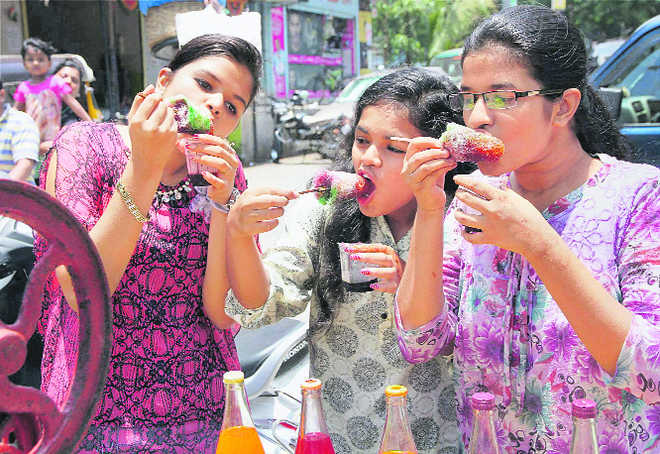
Go easy on street food like ice candies, golgappas etc as the water used may be contaminated
Dr Saurabh Arora
The monsoon provides relief from heat to everyone. This is a time for enjoyment and fun and frolic, especially for children who tend to enjoy the rains. It is also a time to be extra careful about infections, in particular, gastrointestinal infections. Many scientific studies have shown that a number of infectious diseases, including some diarrheal diseases, exhibit a seasonal variation, peaking in the rainy season (Altizer et al., 2006). Moreover, during the monsoon season, the immunity tends to be weakened, making people more susceptible to infections (Paynter et al., 2015).Coupled with this, the digestive enzymes have lower activity, and the digestive system as a whole becomes more sensitive and vulnerable to infections. Therefore, we should be extra careful about what we eat.
During the rainy season, the moisture in the air is very high. Due to this microbes tend to multiply. In particular, the fungi tend to grow and multiply profusely in this increased moisture conditions. The most common fungi that spoil food are the moulds.
Special precautions for food
Bread and other bakery products like cakes, pastries and confectionery are particularly susceptible to spoilage by moulds. So take care not to keep these food items exposed to the moist air for long periods. Consume these items as soon as these are taken out of their air-tight packets. Since cakes and confectionery contain sugar, these are a rich source of nutrients for bacterial growth. This is another reason why these food items shouldn’t be kept out in the open for long. Care should also be taken with milk & milk products, as these are susceptible to contamination and spoilage by micro-organisms in monsoon. Care should be taken for other various ingredients and additives that go into preparation of the dishes. These should be kept in hermetically sealed containers, to avoid exposure to moisture.
Cut fruits also shouldn’t be kept in the open during the rainy season. Consume as soon as these are cut, to avoid any contamination with microbes. Likewise, fruit juices should also be consumed fresh and not stored for later consumption.
Storage
The storage of cooked food is very important. Prepared food should ideally be consumed hot, soon after cooking. In case of consumption at a later time, it should be quickly cooled, carefully covered and stored in refrigerator in order to avoid microbial contamination. While storing food in the refrigerator, the cooked food should be stored in the upper shelves, while the raw food in the lower shelves.
Storage of grains and pulses and raw vegetables should be away from moisture as much as possible. It would be a good idea to avoid buying in bulk during the monsoon season, in order to avoid problems with storage.
It must also be ensured that the kitchen, and in particular the food preparation area is kept clean and hygienic in order to avoid any chances of microbial contamination during cooking. Moreover, cooked food must be kept covered and away from raw food items that will likely be contaminated with microorganisms.
Gastric problems during monsoon
We should be careful while consuming certain types of food during the monsoon time. These include various types of snacks made of mashed potatoes, which might be kept in the open for long. These include samosas, bread and paneer pakoras, which might cause gastric problems if the ingredients are not fresh. Fermented food items like chole bhature can be spoiled by fungi that flourish in the humid conditions prevailing during the rainy season. As a general rule of thumb, all types of spicy and oily food should be consumed in moderation.
Avoid street food
Most types of street foods are generally prepared in the open. There is a chance of contamination of the food with rain water. The stalls are sometimes located near open drains, where there is chance of contamination with coliform bacteria, which can cause serious diarrheal disease. Moreover, the water used for preparing street food favourites like golgappas is likely to be contaminated, and there is a chance of contracting water-borne diseases like cholera and typhoid in this way. Also, fruit juices from street vendors might be kept in the open and served later, increasing chances of contamination. Moreover, there are chances that the glasses and other items will not be clean. Consumption of ice-lollies, kulfi etc during the monsoon season can also lead to stomach problems arising from unhygienic conditions.
Water-borne infections
Personal hygiene is important during the monsoon season, as during this time infections tend to sky-rocket! Water-borne infections can lead to gastroenteritis, diarrhoea, and even serious diseases like typhoid and cholera during the monsoon months, particularly due to a weakened immune system (Paynter et al., 2015).
Venturing out into water-logged streets will result in splashing of dirty rain water onto clothes, hands and feet. Moreover, it is common to see overflowing drains when it is raining heavily. So there is a high chance of contamination with faecal matter also. Therefore, extra care must be taken for hands and feet, which should be thoroughly washed with soap and water as soon as reaching home and before consuming food
Safety tips for drinking water
It is very important to keep the body well hydrated during the monsoon months. Therefore, it is essential to drink plenty of water. Drinking water must be very safe for consumption, since during the rainy season, chances of contamination increases manifold. It should be noted that besides microbes, ground water can be heavily contaminated with chemicals, as these leach easily into the underground water deposits. The best way to ensure safe drinking water is to filter the water, followed by boiling, before drinking.
If these simple precautions and hygienic practices are followed, this will enable you and your family to enjoy and appreciate the true beauty of the monsoon season.
— The writer is founder of foodsafetyhelpline.com



























